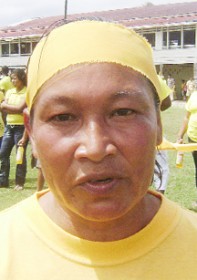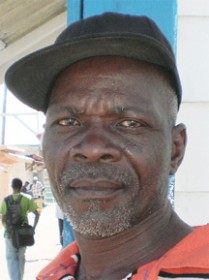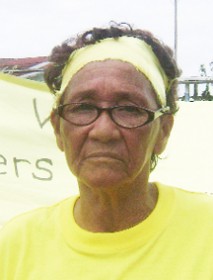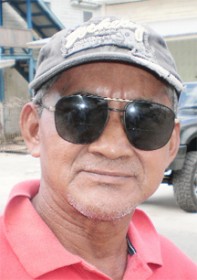By Mark McGowan and
Gaulbert Sutherland
Annie, 75, has lived in Bartica all her life. While the new regulations will not affect members of her immediate family, she was in full support of yesterday’s protest, explaining that she is concerned about the young people and how the new regulations would hinder their ability to earn a dollar. She said not everyone is academically inclined and mining offered the people a way to provide for their families: “They need work and not everybody has knowledge to build themselves, so this little digging and thing is good for them.” Explaining the trend in the community, Annie said that at around age 16, it is almost automatic for persons to go and work in the mining industry to earn a living. She stressed that the new regulations would have a negative impact on the community, which it could ill-afford.

Tishan Pollard, 21, said that mining is “the only option for Bartica youths…when they come out of school is straight in the interior.” He said that if mining is stopped, this will cause a lot of destruction in the community. The youth, who has been mining ever since he was 14, said that it is all he ever did. He said that he was born and grew up in Bartica and half of his family is involved in mining. He added that should a six month notification period be implemented, it would affect them negatively and be “pressure.”
According to miner Lewis Colinet, he understands both the concerns of the government and the miners. He said it is important that mining be done in a way that limits damage to the environment, thus the new measures that the administration is proposing. At the same time, he took part in the protest because he felt that mining is too important to the livelihoods of all Barticians for such a move to be made suddenly. The cost of living in the community, he said, is very high and persons cope with this by going into mining.
He said basic services in the community such as the delivery of health care and education were not always up to the expected standards and as a result residents would send sick relatives to private hospitals and enroll their children into private schools. A person doing a “normal day job” won’t be able to survive in Bartica, he stated.

Farmer Moses Joseph also supported the protest. Joseph, who also works at a hotel to supplement his income, said most of the lodgers are Brazilian miners. He expected that the new regulations would ultimately impact on the occupancy rate of the hotel. Joseph also has relatives-a son and some nephews-who are also involved in the mining industry.

to Bartica for the last 20 years. He supported the activities of the Barticians, since he said the residents had every right to protest against an act that would affect their livelihoods.
Derrick Samuels, a miner from the neighbouring island of Falmouth, said that he had travelled to Bartica to show support on a critical issue. He said that the new initiatives are effectively a way to prevent small miners from continuing their activities. “Everything should go back as before,” he said in relation to the new initiatives.

Prize-winning cook Romeo Singh has been mining for 30 years. He said that he was fully in support of the protest because the majority of Bartica residents earn a dollar from the interior and if it is stopped, they would punish. He declared that there are no other jobs readily available in Bartica that youths can do when they leave school. Everyone he knows is somehow involved in mining, he said and a six-month notification period would be hard on them. He pointed out that the cost of living is high. The born and bred Bartician, who has been working as a cook with CBR Mining for 14 years, disclosed that two years ago he won the top prize in a “pork-knocker” cooking competition.
Housewife Lucille Barker of Riversview, an

Amerindian community on the Essequibo River stated that everyone in her community is engaged in mining. The energetic older woman said that she was at Bartica in support of the protest because “we know if mining is down, we’re out. Our children would punish and everybody in our community would punish.” Barker said the notification period proposed is too long and mining should be allowed to continue as normal. While the grass is growing, she stated, the horse is starving.
Meanwhile, during the rally that followed yesterday’s protest march, several representatives from neighbouring islands and communities indicated their support to the Barticians. Mahdia representative Timothy Junor said that gold was integral to the livelihoods of residents of Regions Seven and Eight and was a key contributor to the country’s economy. He told the gathering that yesterday was the first time in 20 years that he has been to Bartica and he said he had noticed how it had been positively transformed. At this point, he asked the crowd, “what did it?” and the people shouted “Gold!” Junor called on the nation “to wake up” and show its support to the cause that ultimately affected the nation. He told the crowd that this was a struggle and urged them not to grow tired in their efforts.

Agatash Representative Gregory Charles, who is also the Chairman of the Community Development Council, urged those gathered to fight on in spite of the fire. “We must be like Shadrach, Meshach, and Abednego who came through the fire,” he said making reference to the Biblical characters. He said that the other major industries in Guyana such as rice, sugar, bauxite had had their problems and had been negatively affected but said that the same should not be said of the mining sector. “We must have a say in any regulation,” a resident from Itaballi told the gathering, while stressing that “Gold must go on.” The spokeswoman said that gold mining had transformed Itaballi from “a ghost town” to a town “almost like Bartica” and as a result it is very important to that island.





